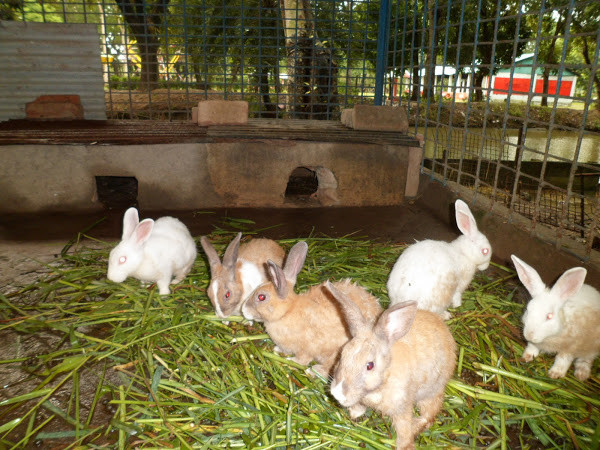

A group of farmers converged at Dr. Beatrice Luzobe’s home in Kisaasi, Kawempe Division, Kampala. Luzobe is a professional agriculturist, who, for many years, taught Ugandans how to do farming. Upon retirement, she decided to engage in agriculture of a unique kind. She keeps rabbits on a large-scale, grows a rare variety of beans and provides consultation in agriculture. She runs her projects under an enterprise called Learn Enterprises Limited (LEL). And now, Harvest Money readers were at her home to learn from her experience as a rabbit keeper.
Luzobe said she established the model commercial rabbit farm in Kisaasi, a suburb of Kampala, to demonstrate the economic feasibility of the enterprise, stimulate other stakeholders into the business and raise income for the company. This is because rabbits have several characteristics that give them a competitive advantage over other livestock for meat. Today, the farm has hundreds of rabbits, including 100 breeders.
Huge benefits
Carrying one of her rabbits, a big white male, Luzobe said rabbits are small-bodied animals, requiring less space and inputs and are prolific and efficient converters of feeds to meat. Their meat is nutritious and healthy because it is white, rich in protein, has low quantities of fat and cholesterol.
Rabbits have minimal effect on climate change because their production of methane and effects of overgrazing are negligible and they can also be raised for non-food purposes, which create more job opportunities. All the above make rabbit-keeping an important enterprise in areas where there is shortage of agricultural land and for the vulnerable and resource poor, for example the youth, who are unemployed and lack the critical production resources (land and capital). Luzobe said rabbitry provides an excellent option to people who are conscious about health dieting and are avoiding high fat / high cholesterol foods as much as possible.
Going through the value chain
Luzobe told her visitors that one of the challenges that faced the industry was failure by farmers to go through the entire value chain. She noted that most people are scared of ‘killing’ a rabbit, an animal so tender. “Here, we slaughter, package and sell rabbit meat to individual consumers. Our biggest challenge is how to satisfy our customers. We would like to link up with other farmers to meet the high demand,” she says.
Luzobe told the visitors that there is ready market for the meat. She said a few years ago, she carried out a mini market survey, covering Kampala and Mukono towns. The survey was among 152 individuals and 63 institutions. They included hotels, restaurants, supermarkets and meat joints. “The estimated total monthly demand was at 450kg and 520kg for individuals and institutions respectively.
However, 90% of the potential customers, who had ever eaten or sold rabbit meat, were frustrated by the unavailability of the product and had actually stopped,” she said.
Not a get-rich-quick venture
“My advice to the current and aspiring farmers is to get out of the get-richquick craze. According to the projected cash flows,
rabbit-keeping has higher returns to investment (but over a longer time) than that of chicken because one builds his own stock (not possible to access one-day old bunnies). Rabbits for any purpose are safer to buy after one month of suckling and mother care,” she said.
What a good rabbit farmer must do
Luzobe says a good rabbit keeper should take care of the following aspects;
*Know that like any other livestock business, rabbit keeping requires investment into structures, feeds, veterinary services and labour. The level of investment depends on the location and availability of inputs.
*Rabbitry is a TLC (tender-loving caring) project, which requires daily attention, record keeping and serious follow-up on breeding and maturity dates. Acquire information from technical people and experienced farmers. Avoid opportunists who masquerade as experts in the field.
*Acquire good breeds from farms with technical persons or experienced farmers. Avoid the temptation of becoming a breeder, unless you are technically qualified.
One of the best breeds for our environment is the New Zealand White. Avoid in-breeding because it weakens the quality of the breed as time goes on.
*Scale up production to economically viable and sustainable levels. For the peri-urban farmers, who adopt the intensive system, at least 50 breeders with an output of over 150 fryers per month would be viable. The rural dwellers can target five to 10 breeders since they are most likely to feed on foliage, which can become a limiting factor during prolonged drought.
*Concentrate on the meat market and deliver a ready-to-cook product. This is convenient to the consumers, who may not even know how to slaughter and process rabbit meat.
*Price your product close to that of the biggest competitor, chicken meat. Overpricing may make a one-time big kill, but may not sustain the business.
Next Reading
Brucellosis , a common cause of Abortion in cattle
A very common cause of abortion is Brucellosis, which can also infect humans. Brucellosis is […]
Previous Reading
Former Farmer reaps big from farming venture
Francis Kimani studied Kiswahili, History and Journalism where he majored in public relations. His desire […]
 Contact Jaguza Support
Contact Jaguza Support